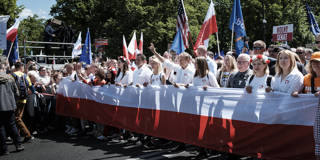OnPoint Subscriber Exclusive
Interviews feature exclusive interviews with prominent leaders and thinkers on issues of global importance.

The View from Poland
As the war in neighboring Ukraine continues into its second year, emotions are running high in Polish political life. Given major domestic political and social developments, including a general election in the fall, as well as broader geopolitical realignments, 2023 is shaping up to be a watershed year.
Since Russia’s full-scale invasion of Ukraine in February 2022, Poland, the European Union’s largest front-line state, has come in from the cold. Criticism of the populist right-wing government’s anti-democratic behavior, including its politicization of the judiciary and public media, has largely fallen by the wayside, owing to Poland’s centrality to the logistics of channeling Western weapons and other military support to Ukraine. But while the ruling Law and Justice party has capitalized on this role to insulate itself from EU pressure, its efforts to tighten its grip on power may force a domestic reckoning.